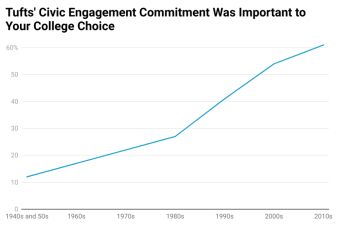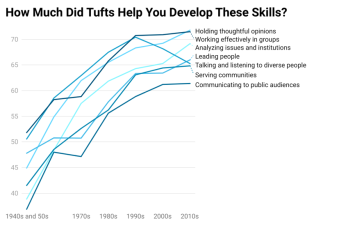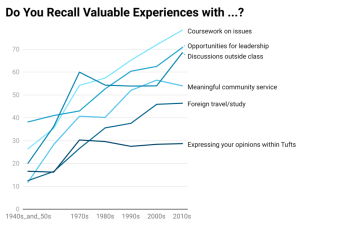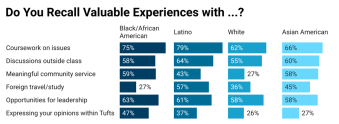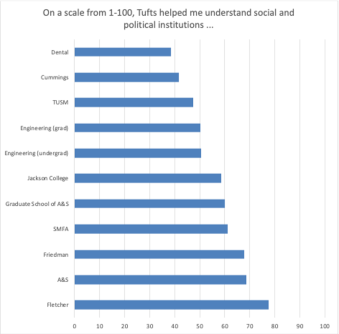Civic Jumbos: Alumni Survey Sheds Light on Civic Life of Tufts Community
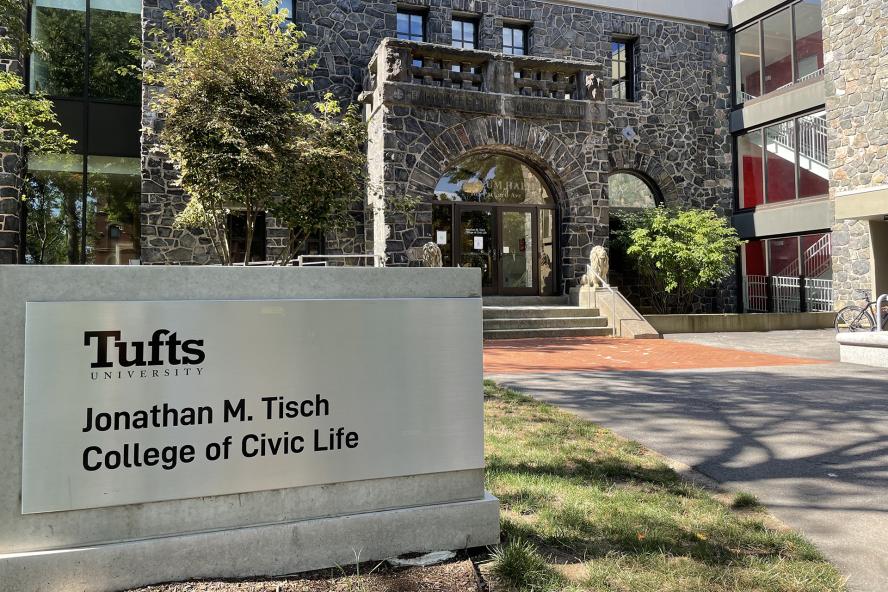
More than half of recent alumni say that Tufts’ commitment to civic engagement factored into their decision to attend Tufts, according to a recent survey conducted by the Office of Alumni Engagement and the Jonathan M. Tisch College of Civic Life. The proportion of alumni who report that they experienced excellent civic experiences while at Tufts has risen steadily over the decades. The survey sheds light on student and alumni experiences with civic engagement and service over the past 70 years at Tufts. It was conducted to learn about how alumni reflect on their time as students and their post-graduate contributions to civic life, as well as how they would like to engage with Tisch College’s programming in the future.
In a letter accompanying the survey, Tisch College President Tony Monaco wrote, “Since Tufts’ founding, the ideals of service, civic engagement, and working together for the greater good have been embedded in the mission of the university. While this commitment extends back many years, it was formalized in our academic structure more than 20 years ago when Tufts founded the University College of Citizenship and Public Service, now called the Jonathan M. Tisch College of Civic life.”
Of the results, Tisch College Dean Dayna Cunningham states, “We are grateful to the thousands of Tufts alumni who participated in this survey. We know that the University’s strong commitment to civic engagement, which is embodied in Tisch College, is important to our alumni and, increasingly, is a factor in students’ decision to attend Tufts. Surveys like this one help us understand how we are meeting our mission and where we can do better.”
Peter Levine, Associate Dean of Academic Affairs at Tisch College, who helped develop the survey, stated, “A priority was to gauge alumni interest in specific kinds of programs. The survey also gave us a chance to learn more about whether and how Tufts had affected their civic engagement.” The results will be used to further engage Tisch College alumni in programs and events related to the college, as well as studying the types of programs that Tisch College offers to current and future Tufts students.
Examining Survey Data
Recent graduates’ interest and engagement in civic experiences on campus corresponds with the expansion of Tisch College’s programs and research opportunities for students. Over the past 20 years, Tisch College has grown significantly, expanding student programming, including through the Tisch Scholars, Tisch Summer Fellows, Tufts 1+4 Bridge Year, Tufts Civic Semester and Community Service Learning programs with local and national non-profit organizations, corporations, and political offices. During this time, the university has become increasingly diverse. Conducted across all Tufts Schools, the response to the survey was large (for a survey of this type) with 8,780 alumni responding, a 12 percent response rate.
Figure 1
Tufts’ commitment to civic engagement has not only become a larger presence on campus in recent years, but it plays an important role in college choice. Over half of alumni surveyed from the past decade responded positively to the effect that this commitment had on their decision to attend Tufts (Figure 1). For Levine, this was one of the most interesting results of the survey, “An outright majority (more than 60 percent) of recent graduates say that they chose Tufts in part because of the university’s commitment to civic engagement. That response is more common for younger cohorts of alumni. For example, only about one quarter of 1980s graduates recall that civic engagement was a reason they came to Tufts.” Overall and across all class years, alumni of color were more likely to report that civic engagement was a factor in their college choice (43 percent for Black students, 53 percent for Latino students, and 54 percent for Asian-American students) (Figure 2). For a university committed to creating a diverse student body and experience, a commitment to civic engagement is vital.
Figure 2
Alumni were asked to reflect on and evaluate how Tufts helped them to develop skills that would serve them in their civic life, including holding thoughtful opinions, communicating to public audiences, working effectively in groups, and analyzing issues and institutions. Recent graduates reported better experiences developing these types of skills as students, including coursework on issues, opportunities for leadership, discussions outside class, and foreign travel and study (Figure 3).
Figure 3
Figure 4
There are a few notable exceptions. 65 percent of alumni in the last decade say that Tufts helped them to talk and listen to diverse people, a significant increase from earlier decades but a slight decrease from 70 percent in the 1990s. Students may view the Tufts community’s overall political beliefs as homogenous, or perhaps students and alumni are setting higher standards for inclusion and equity at the university. Another recent decrease is in “meaningful community service.” Again, this could reflect rising standards, although Tisch College and Tufts University also increasingly name “community service” using different terms, such as “service learning” and “civic impact.”
Differences also emerged by race and ethnicity (Figure 5). When asked about on campus opportunities with civic engagement, alumni of color were twice as likely to report “meaningful community service” experiences and slightly more likely to report “valuable experiences in coursework on issues.” In the last 30 years, around 60 percent of all students reported experiencing “opportunities for leadership” at Tufts (Figure 4). Black alumni were more likely than other groups to report expressing opinions within Tufts (47 percent, compared to 30 percent for all alumni).
Figure 5
Commitment to civic engagement and service is a university-wide endeavor (Figure 6). Graduates from each college were asked whether Tufts helped them to “understand social and political institutions” and at most schools, over 50 percent of respondents answered affirmatively. The rate was highest at the Fletcher School, followed by the School of Arts & Sciences. In the professional schools, alumni still report considerable attention to social and political institutions, although those schools show more room for growth. These differences are important data to consider as both Tisch College and Tufts University work to make community engagement and civic life a central aspect of a Tufts education across all schools.
Figure 6
Survey Conclusions
As with any survey, the data gathered has shortcomings. For example, an inclination to respond to a survey of this type may skew the group towards a more engaged set of alumni who feel a stronger connection to the University or Tisch College. In addition, of those who responded, 98.8 percent reported voting in the 2020 presidential election, making the respondents a highly civically engaged group, as well. And, there were some limitations to the data collection: notably, many alumni living in the EU were unable to respond to the survey. These issues and others notwithstanding, the data are valuable in looking at trends, particularly among recent graduates, and in terms of what they may reveal about Tisch College’s research, courses, and programs.
Tufts University is a community committed to providing transformative experiences for students, empowering them to face complex challenges and to distinguish themselves as active citizens of the world. The work of Tisch College over the past two decades continues to serve the mission of preparing all Tufts graduates for a lifetime of engagement in civic and democratic life. As Tisch College grows, so too do opportunities to examine our impact critically and to seek opportunities to meaningfully engage more students and alumni with this vital work.
